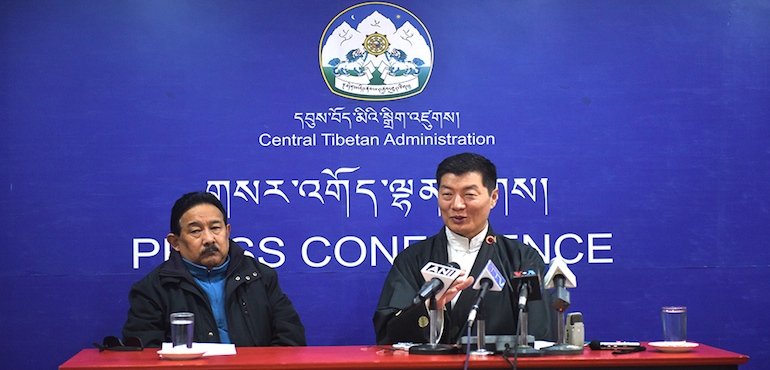
Sikyong Dr Lobsang Sangay and Kashag Secretary Mr Topgyal Tsering speaking to media on 2nd February 2017
Photo:tibet.net
Tibetan Prime Minister (Sikyong) Dr Lobsang Sangay, the head of Tibetan Government-in-exile, announced revisions to the Women’s Empowerment Policy on February 2. The revisions have been made by his office, the 15th Kashag, or Cabinet, of the Tibetan Government-in-Exile.
Dr Sangay acknowledged the previous Kashag’s policy on women’s empowerment as extremely helpful in facilitating an environment where men and women could equally take part in the Tibetan freedom struggle.
Explaining the reason for the revision of policy, Dr Sangay said “It has been almost ten years since the women empowerment policy was introduced by a previous Kashag. Since then, there has been a lot of discourse in the national and international forums including within our community about the need to relook and revise the policy”.
Sikyong further emphasised the importance of women’s empowerment by quoting His Holiness the Dalai Lama: “Women make better leaders as they are inherently kind, compassionate and equipped with qualities to nurture and care”.
The revised seven-point policy was drafted by senior women officials of Tibetan Government-in-exile, also known as the Central Tibetan Administration (CTA). The sevenpoints include: women and human rights;education;health; economy;governance and leadership; social issues and sexual and gender-based violence (SGBV).
Details of the revised policy can be found at Tibet.net
The current policy was introduced by the 13th Kashag under the leadership of Professor Samdhong Rinpoche in October 2008.
The CTA also announced its First Women’s Empowerment Conference to be held from February 21 – 23 in Dharamshala. The Conference will aim to bring together around 250 participants, both men and women, from all walks of life to discuss various relevant topics.




 Print
Print Email
Email